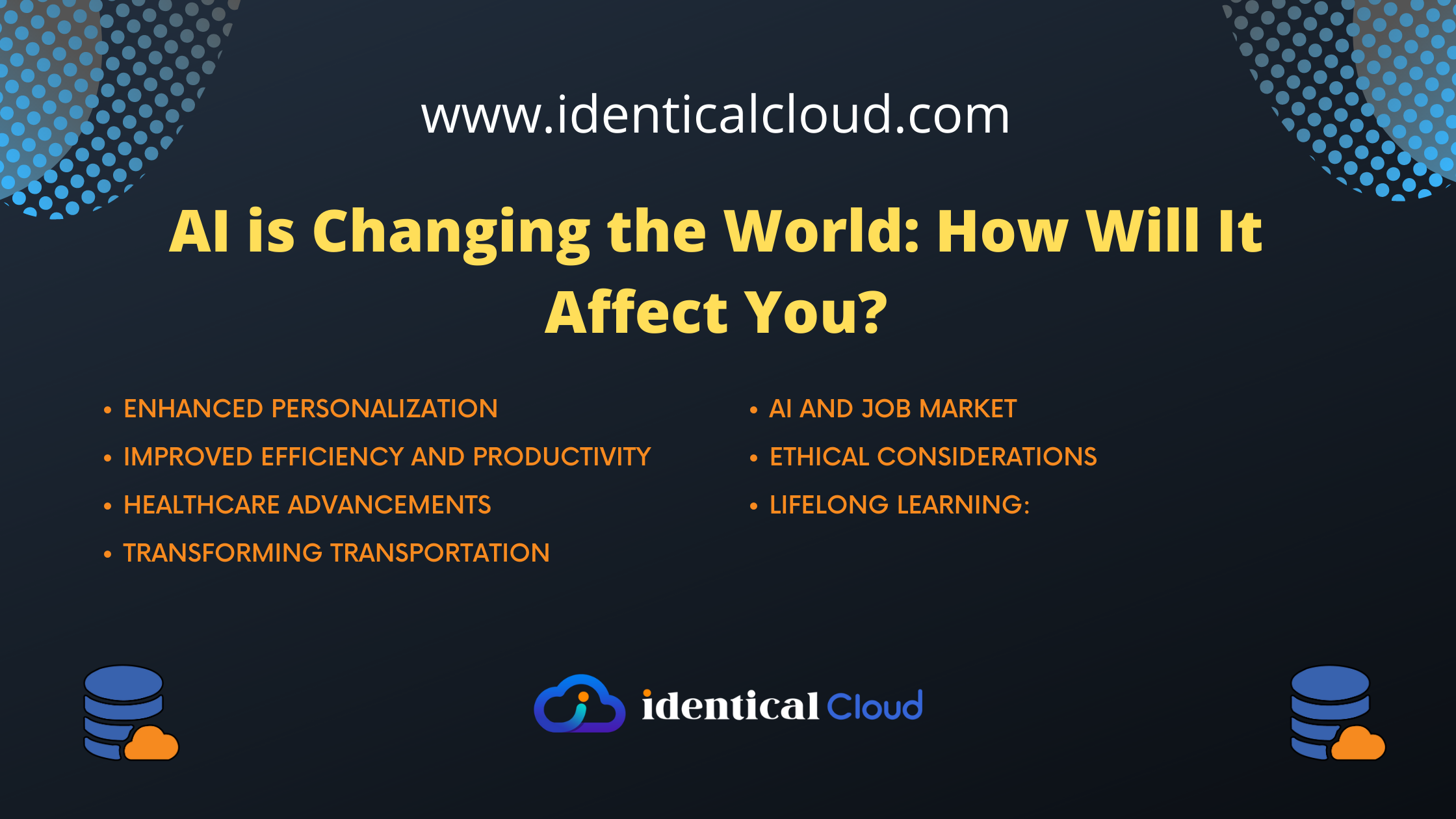
AI is Changing the World: How Will It Affect You?
AI is Changing the World: How Will It Affect You?
Artificial Intelligence (AI) is no longer a concept confined to science fiction movies; it has become an integral part of our daily lives. From voice assistants and recommendation algorithms to autonomous vehicles and personalized healthcare, AI is transforming the world as we know it. But how will it affect you?
In this blog post, we will explore the ways AI is changing the world and discuss the potential impact it may have on individuals like yourself.
- Enhanced Personalization:
AI has ushered in an era of personalized experiences. From tailored recommendations on streaming platforms to customized product suggestions on e-commerce sites, AI algorithms are continuously learning about your preferences, behaviors, and needs. This means you can expect more relevant content, services, and products that cater specifically to your interests. AI-powered virtual assistants will become even more intuitive, understanding your voice commands and providing personalized assistance in your daily tasks. - Improved Efficiency and Productivity:
AI is revolutionizing industries by automating repetitive and mundane tasks, freeing up time and resources for more complex and creative endeavors. This shift towards automation means that certain jobs may be transformed or eliminated altogether. However, it also presents opportunities for individuals to focus on higher-value tasks that require critical thinking, problem-solving, and emotional intelligence. AI will enable you to work more efficiently and effectively, leveraging its computational power to augment your skills and abilities. - Healthcare Advancements:
AI is making significant contributions to the field of healthcare, improving diagnostics, treatment plans, and patient care. Machine learning algorithms can analyze vast amounts of medical data, helping doctors make accurate diagnoses and predict outcomes. AI-powered tools can assist in medical imaging interpretation, drug discovery, and precision medicine. As a result, you can expect more accurate and personalized healthcare, leading to better health outcomes and improved quality of life. - Transforming Transportation:
Autonomous vehicles are on the horizon, promising safer and more efficient transportation. AI-powered systems can analyze data from sensors, cameras, and radar to navigate roads, make split-second decisions, and prevent accidents. While fully autonomous vehicles may still be a few years away from widespread adoption, AI is already impacting transportation through ride-sharing algorithms, traffic optimization, and smart city initiatives. These advancements will not only change how you commute but also have far-reaching implications for urban planning, energy consumption, and sustainability. - AI and Job Market:
The integration of AI into the job market raises questions about the future of work. While automation may replace certain tasks, it also creates new opportunities and job roles. AI specialists, data scientists, machine learning engineers, and AI ethicists are in high demand as organizations seek to leverage AI technology. Additionally, AI can augment human capabilities, allowing individuals to focus on tasks that require creativity, empathy, and complex decision-making. The key for individuals will be to adapt and acquire the skills necessary to thrive in a technology-driven job market. - Ethical Considerations:
As AI continues to advance, ethical considerations become increasingly important. Issues such as data privacy, algorithmic bias, and transparency need to be addressed to ensure that AI is used responsibly and ethically. There are ongoing discussions around the impact of AI on social dynamics, inequality, and privacy rights. It is crucial for individuals to be aware of these considerations and actively participate in shaping the ethical guidelines and regulations surrounding AI. - Lifelong Learning:
As AI continues to evolve, it emphasizes the need for lifelong learning and adaptability. The pace of technological advancements means that skills can become obsolete quickly. To stay relevant in the AI-driven world, continuous learning and upskilling are essential. It’s important to embrace opportunities for learning, whether through formal education, online courses, or professional development programs. By staying proactive and adaptable, you can navigate the changing landscape and harness the potential that AI offers.
AI is changing the world in profound ways, impacting various aspects of our lives. From personalization to efficiency improvements and advancements in healthcare, AI offers tremendous potential. While it may bring challenges and uncertainties, being proactive, adaptable, and ethically aware can help you navigate the AI-driven future successfully. By embracing the opportunities and understanding the implications, you can harness the power of AI to improve your life and contribute to a better world.
